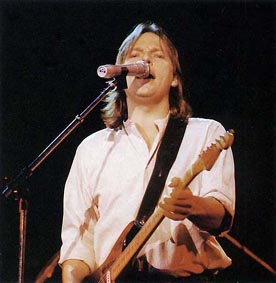


Sing 'til the walls around us ring
The voice of David Gilmour
There is something about the voice that is, to the experienced ear, unmistakable. David Gilmour has a well-deserved reputation as a guitar god, as evidenced by the multitude of people he has appeared onstage and on record with--rock legends in their own right who could easily get any guest guitarist they wanted. But as distinctive as his guitar sound is, his voice has played just as important a role in shaping the Pink Floyd's sound.
Any list of the Floyd's biggest hits will feature Gilmour's voice prominently: "Breathe", "Time", "Money", "Wish You Were Here", "Young Lust", "Comfortably Numb", "Learning to Fly", and so on. In fact, it can be argued that a large part of Gilmour's ability to recreate the classic Floyd sound so effectively in the post-Waters years is due to the fact that his voice and guitar dominate--and, in some ways, define--what many fans expect Pink Floyd to sound like.
 Gilmour croons in 1977. |
He was hired, initially, to shadow Syd Barrett onstage, and was expected to play the guitar parts and cover essentially all the vocals when Barrett was unable to do so. "Nobody else wanted to sing them, and I got elected," Gilmour told Guitar World magazine in 1993. But on A Saucerful of Secrets, Gilmour's first album with the Floyd, he sang lead on only one track, "Corporal Clegg".
By 1969's More soundtrack, however, the band settled into a pattern that would be repeated again and again for the next ten years: Gilmour sang Waters' lyrics in songs on which he had no writing credit at all. Gilmour sang lead vocals on all seven tracks with lyrics (although to be fair, Waters did sing "Cymbaline" on the film version, while Gilmour's version was released on the soundtrack album). Ummagumma and Atom Heart Mother were 'you wrote it, you sing it' affairs through and through, but with Meddle and Obscured by Clouds, Gilmour was given the lion's share of the vocal duties. By the release of The Dark Side of the Moon, Waters had emerged as the band's premiere lyricist, but Gilmour had become the primary vocalist.
Wish You Were Here is heavy on lengthy instrumental passages, and relatively light on lyrics, but Waters did get back into the act, providing vocals for "Shine On You Crazy Diamond". (He had apparently intended to sing "Have a Cigar" also, but found that it was a bit out of his range, so it was given to outsider Roy Harper, much to Waters' dismay in later years.) But Gilmour sang on the radio-friendly title cut, as well as "Welcome to the Machine".
On Animals, Gilmour's vocal contributions are limited to just one song--"Dogs"--and a few backing tracks. And with the protagonist and story of The Wall being so closely tied to Waters, it is no surprise that he sang much of the album. But Gilmour's vocal contributions are not to be overlooked. His voice provides much-needed warmth and depth on songs like "The Thin Ice", "Goodbye Blue Sky", and "The Show Must Go On". He sings harmony and backup on a number of tracks. And when Waters and Ezrin decided that the different characters in the songs like and "Mother" and "Comfortably Numb" needed to be brought out with different vocalists, Gilmour got the nod.
The Final Cut was, in many respects, Waters' attempt to strengthen his hold on the band. For the first time, he acknowledged no input from others in the songwriting. He refused to compromise on production issues as he had done on The Wall, and Gilmour, for whatever reason, did not fight him much. And Gilmour's role as singer was reduced even further, being given only one song to sing, "Not Now John", which was inexplicably chosen as a single release.
In the years that followed, with Waters gone and Gilmour at the helm doing much of the songwriting and production, he ended up doing almost all of the lead vocals. A Momentary Lapse of Reason started out with the intention of becoming a Gilmour solo project if the Floyd 'reunion' fell through, so the fact that he did all of the singing is no surprise. Rick Wright had done so little singing since his 1978 solo album (and since 1973 on Floyd recordings!), and Nick Mason had never done any serious singing in the studio, so the vocalist gig was naturally Gilmour's. "Wearing the Inside Out", from The Division Bell, saw Wright's return to lead vocals, but the rest of the album was Gilmour's.
On the road, the fact that so many of the familiar hits had been sung originally by Gilmour only strengthened his position as the frontman for the reconstituted band. Even songs that had been sung originally by Waters, such as "Shine On You Crazy Diamond" and "Brain Danage" were done so convincingly by Gilmour in concert that many newer Floyd fans have been surprised to discover that Gilmour's voice wasn't on the studio versions. On tunes in which Gilmour had originally traded vocals with Waters, he chose to preserve this arrangement, finding others to sing the parts that were historically Waters': keyboardist Jon Carin sang the final verse of "Hey You" on the 1994 tour, and bassist Guy Pratt sang Waters' parts on "Comfortably Numb" and "Run Like Hell".
I hear your soft voice calling to me... Gilmour's vocals are generally deep and rich, with a warm, soothing quality. He does not have a typical "singer's voice", but he has found ways to use it quite well within a limited range, and to tailor his songwriting to fit his voice. (Waters, by contrast, was constantly writing songs that he could not--or chose not to--sing on record: songs like "Have a Cigar", "Green is the Colour", and "Cymbaline".)
Tracks like "Cirrus Minor", "Crying Song", "Pillow of Winds", and "Fat Old Sun" make use of the soft airiness in Gilmour's voice to emphasize the gentleness of the lyrics. And while he generally sings in a lower register than Waters does, he also makes use of a decent falsetto on occasion, as in "Wot's... uh the Deal" and "The Thin Ice".
You can scream and shout with all your might... In sharp contrast to the softer side of his voice, Gilmour sometimes employs a harsh, throaty, shouted delivery. "The Nile Song" and its cousin, "Ibiza Bar", were perhaps the first recordings in which this particular vocal style was used, but they definitely weren't the last. "Money", "Not Now John", "The Dogs of War", and "Take It Back" all feature a certain degree of shouting. Sometimes this is done within the spirit of the lyrics--in "Not Now John", for example, the lyrics are the words of an angry, disaffected, blue-collar Brit, and the shouting matches the emotion. But in "Take It Back" there is no obvious lyrical reason for the shouting; it seems to have been done just to fit the sound of the song.
The shouting is even more pronounced on live recordings, perhaps as he tries to sing loud enough to be heard over the stacks of amplifiers and the fans themselves. He resorts to shouting in live versions of "Green is the Colour" and "The Narrow Way", especially during the higher parts--it is almost as though he has to shout to get up to the notes. (A Dutch radio broadcast of a 1969 performance of "The Narrow Way" as part of The Man and The Journey suite is renowned for Gilmour's particularly off-key vocal, as he fails to hit the high notes in a spectacular fashion.)
Harmony is a song of tears... Gilmour's vocal talents also extend into the realm of harmony and backing vocals. This is no small feat, as anyone who has ever tried it can attest. Blending voices can be quite demanding, and it sometimes calls for extraordinary flexibility and range that lead singing doesn't. And though the Floyds have never featured harmonies as prominently as, say, the Beatles or the Eagles, the few glimpses into the harmony tracks we are given on the recently-released Classic Albums: The Dark Side of the Moon DVD shows just how effectively the Floyds could use them. Hearing Gilmour's backing vocal harmonies on "Breathe" is something of a transcendent experience--even more so because many listeners had never really listened for the harmonies, or heard them at all.
 Gilmour singing during performance of The Wall. |
Gilmour and Wright blend their voices beautifully on a number of songs, from the live version of "Astronomy Domine" on Ummagumma and "Crumbling Land" from the Zabriskie Point soundtrack to "Echoes" and "Burning Bridges". Gilmour also provides harmonies to Waters' lead vocals on songs such as "Brain Damage".
Lost for words... Some of Gilmour's memorable vocal moments come in unlikely places--such as instrumentals. While Waters' ranting on "Careful With That Axe, Eugene" is the focal point, especially in live versions, Gilmour's falsetto "ooooh"s are as crucial to setting the menacing, foreboding mood of the piece as any of Wright's organ noodling or Mason's insistent cymbal work. The closing section of "A Saucerful of Secrets" similarly featured Gilmour's wordless vocals in live renditions, adding power and a sense of drama that the studio version lacked.
Gilmour also used his voice to embellish the occasional guitar solo, using a trick that few musicians are capable of at all. In several 1977 performances of "Wish You Were Here", as well as most live versions of "Green is the Colour", Gilmour would sing along with his guitar, matching his improvised solos note-for-note. It is one thing to know how the solo is going to sound, but it takes an impressive degree of vocal control to sing the pitches as they are being improvised. And it almost goes without saying that it takes a lot of guts to get up and do it in front of an audience of thousands, unrehearsed, with the very real possibility that one wrong note could ruin the entire solo.
Clearly Gilmour is no slouch, musically. As a guitarist, he has never had the fastest fingers, or the flashiest stage antics, and as a singer, he has never had the best set of pipes. But he always finds ways to play and sing melodies that fit his abilities perfectly. He plays to his strengths. And though he is acclaimed as a guitarist's guitarist, his singing is an important part of his arsenal.